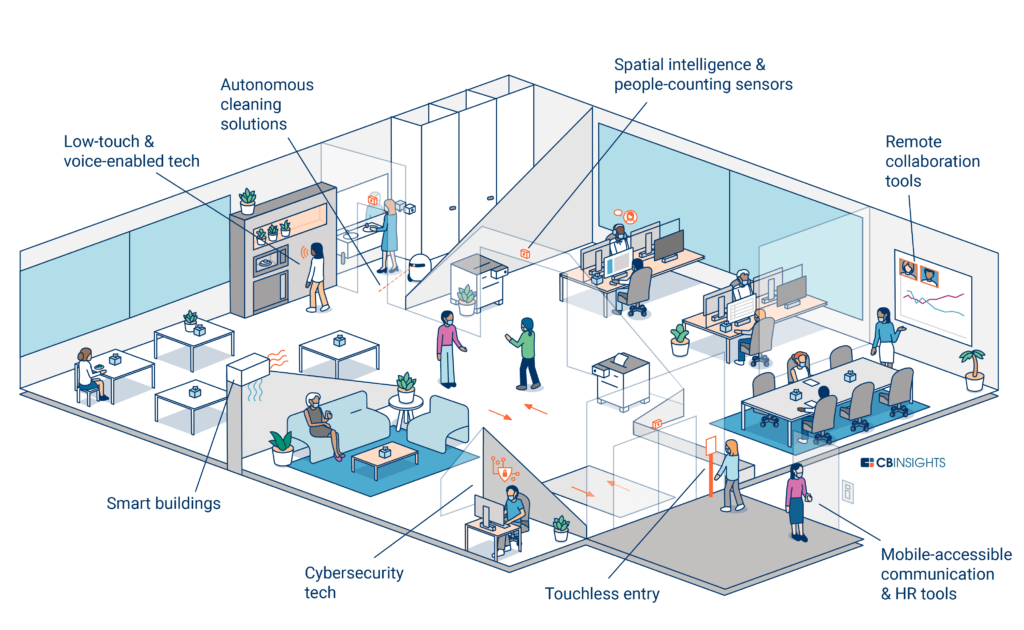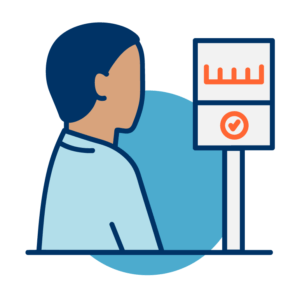Reopening: The Tech-Enabled Office In A Post-Covid World
Covid-19 will have a lasting impact on company operations and office spaces. From autonomous cleaning devices to tighter cybersecurity measures, here are the technologies influencing how the office could look during the reopening process and beyond.The Covid-19 pandemic has disrupted nearly every aspect of our lives, including tasks as fundamental as going to work.
While many office workers are still working from home, others across the world are now beginning to return to their offices in person for the first time in months. However, in the US, 2 out of 3 workers still feel uncomfortable returning to the workplace, according to a Qualtrics study. Outbreak prevention, worker safety, and employees’ peace of mind will be top concerns for businesses around the world as they begin to reopen their office doors.
In this report, we dive into some of the technologies that will help address these concerns and influence the future of the office space, from autonomous cleaning solutions to people-counting sensors.
While the World Health Organization (WHO) and other health authorities have issued guidance for companies to make offices safer, reopening plans vary widely between countries and cities. And as we continue to learn more about the virus, no one solution has emerged as a standalone prevention method. For example, some experts point to social distancing as being most vital to reducing spread, while others highlight wearing masks as key.
Companies will have to look to guidelines from local and national authorities for each office location. Their strategies will likely involve a combination of approaches to minimize risks for employees, which can be aided by the technologies and startups featured in this report.
Throughout this report, we visualize the tech-enabled in-office journey for an employee whom we’ll call Rachel. Here are some of the new considerations and technologies that may impact each part of Rachel’s working day.
Moving forward, many companies will likely reconsider their corporate real estate footprint, whether that involves downsizing or redistributing space to satellite offices. A completely remote workforce seems unlikely, given the intangible benefits of social connection, collaboration, and innovation that in-person working provides. Nonetheless, it will be crucial to create optimal conditions for employees to work remotely as well as in the office.
To stay ahead of the curve, companies will need to consider key investments across wellness, remote collaboration tools, mobile cybersecurity tech, accessible HR tools, and workforce training programs for professional development and upskilling.
TABLE OF CONTENTS
- Lobbies and building entrances: pre-entry wellness checks
- Elevators and common spaces: touchless entry and air filtration
- Desk space: social distancing sensors
- Conference rooms: remote collaboration tools
- Bathrooms: autonomous cleaning solutions
- Kitchens: low-touch and voice-enabled tech
- On-the-go HR: employee wellness, communication, and engagement tools
- Beyond the office: cybersecurity and at-home network security
- Conclusion
Lobbies and building entrances: pre-entry wellness checks Rachel arrives at the building at her scheduled time slot. Her temperature is checked before she waits in a socially distanced line for the elevator.
As a building’s first point of contact — and first line of defense — entrances and lobbies are poised for a revamp in policies and procedures when it comes to fighting the spread of Covid-19. The criteria for authorized occupants could include pandemic-specific considerations like employee schedules, health indicators, and contact tracing.....MUCH MORE
Many companies that have already returned to work are using apps and daily health surveys to screen employees before arrival. This ensures that employees experiencing symptoms or who have been exposed to a positive case of Covid-19 do not come in.
In China, QR code-based immunity passports embedded within super apps like WeChat and Alipay have become ubiquitous, already rolled out in at least 200 cities. Individuals using Alipay’s Health Code fill out a form in the app and the software uses big data to generate a QR code depending on a user’s contagion risk. Those who are designated green are able to travel freely, while yellow or red indicate suggested 1- or 2-week quarantines, respectively.
Elsewhere, UK-based Onfido and Germany-based IDnow have each actively engaged with the UK government to discuss the use of immunity passports, which would tie official Covid-19 test results to a user’s digital identity.
Similarly, New York-based biometric startup CLEAR, whose kiosks are seen in airports and stadiums around the country, has developed Health Pass, which links biometric identifiers to Covid-19 health information that users upload through approved test providers....
Apologies to the spirit (and literary estate) of Dr. Martin Luther King for any impertinence in the headline.


